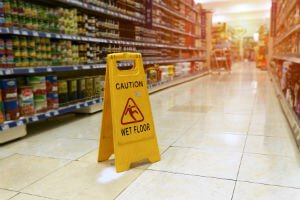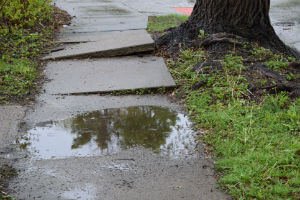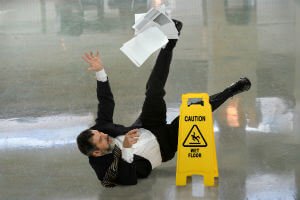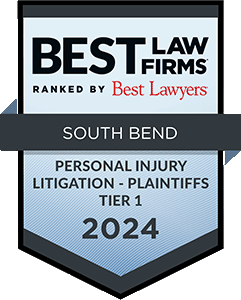 Most slip and fall accidents cause minor injuries and victims recover relatively quickly. Unfortunately, some falls cause severe injuries that result in long-term health problems.
Most slip and fall accidents cause minor injuries and victims recover relatively quickly. Unfortunately, some falls cause severe injuries that result in long-term health problems.
If you suffered a severe injury in a slip and fall accident on someone else’s property, a qualified South Bend premises liability attorney will be able to help you determine if you have a viable claim against the property owner.
At Pfeifer, Morgan & Stesiak, we are a team of South Bend injury lawyers who are ready to help you investigate the possibility of filing a premises liability claim to recover the compensation you may be entitled.
Three Types of Visitors
One of the main factors that determines the validity of your premises liability injury claim is your status as a visitor on the property at the time of the accident.
There are three categories of visitors to any property, and property owners have different legal obligations to each of them.
Invitees
This category includes:
- Public invitees – These are members of the public who are using the property for the same reason it is open to the public. An example of a public invitee is someone who goes to a city park for recreation or to the public library to read a book. There is an implied invitation to use these properties.
- Business invitees – These are people who were invited onto a property for their benefit and the property owner’s economic benefit. The most common example of a business invitee is a customer in a retail store or restaurant.
- Social guests – This designation applies if someone has invited you to his or her property. This applies to a guest who was invited to a neighbor’s house for a party.
Property owners have a legal obligation to invitees to exercise reasonable care to eliminate unsafe conditions or provide adequate warning about any hazards.
This means that property owners could be held liable for injuries to an invitee if the invitee proves one of four things:
- The property owner created the hazardous condition that led to the injury.
- The owner knew the condition existed and failed to correct it.
- The condition existed for an extended period of time so that the property owner should have discovered it, even if he or she did not know it was there on the date of the incident.
- The property owner did not provide adequate warning about the dangerous conditions on the premises.
Property owners could also be held liable for failing to conduct proper maintenance of the premises, including regular cleaning, conducting regular maintenance to fix floorboards or dips, removing snow and ice, and removing debris or spills.
Licensees
These are people who received permission to be on a property for their own convenience, curiosity or entertainment. An example would be someone who received permission to enter a hunting area.
Property owners have fewer legal obligations to licensees than to invitees. In general, property owners only have a duty to avoid willfully or wantonly hurting you or increasing the amount of danger you could potentially face.
Indiana Code 34-30-3-1 gives property owners immunity from liability for injuries to licensees who are not being compensated to use property for gleaning agricultural products. The only exception is if the licensee’s injury is a direct result of gross negligence or willful or wanton misconduct.
Trespassers
Under Title 34 of the Indiana Code, trespassers are people who enter or remain on another person’s property without:
- The owner’s consent.
- An actual or implied invitation from the other person.
- The right to enter or remain on the property.
Property owners have no legal obligation to trespassers they are unaware of. However, once a property owner is aware of a trespasser’s presence, he cannot willfully or wantonly injure the person.
If the trespasser is a child, the property owner could be held liable if six conditions are met, as outlined in Indiana Code 34-31-11-3:
- The property owner permitted the structure or condition that caused the injury.
- The structure is especially dangerous for children.
- The danger is uncommon or unlikely to be comprehended by children.
- The structure or condition is especially enticing to children.
- The possessor has knowledge of the structure or condition and the likelihood that children will trespass and suffer injuries.
- The injury was natural, probable and foreseeable.
Slip and Fall Accidents on Government Property
If your slip and fall accident occurred on government property, the governmental entity responsible for the property cannot be held liable if the injury was caused by one of 24 things, outlined in Indiana Code 34-13-3-3. Some of these things include:
- The natural condition of unimproved property
- The temporary condition of a public thoroughfare or extreme sport area
- The condition of an unpaved road, trail or footpath that provides access to a scenic or recreational area
- The condition of a reservoir, dam, canal, conduit, drain or similar structure when used by someone for a purpose that was not foreseeable
- Failing to make an inspection of a property, except for government property, to determine if the property complied with or violated the law or contained a hazard to health or safety
Like many legal claims, you must bring your slip and fall case within a certain timeframe, or you can be barred from asserting it at all. This time period is often referred to as the statute of limitations.
In Indiana, you have two years from the date of the injury to assert your slip and fall claim. However, it is a good idea to start the legal process as early as possible.
Our premises liability lawyers offer a free initial consultation and do not collect attorney’s fees unless there is a favorable resolution of your claim.
Contact our team at (574) 444-0741 for help today.











